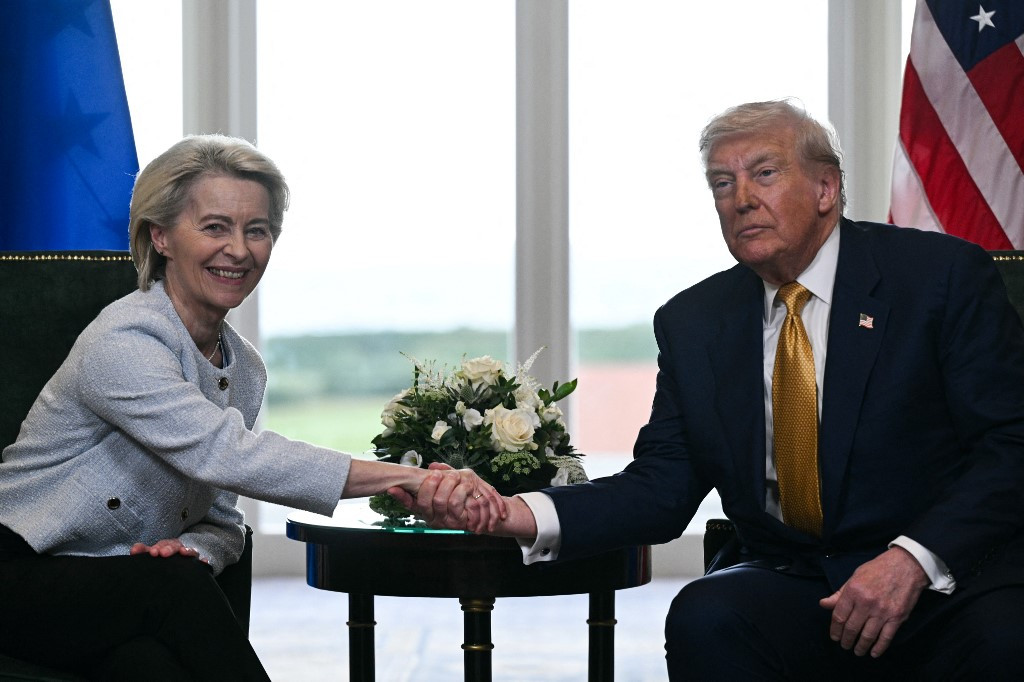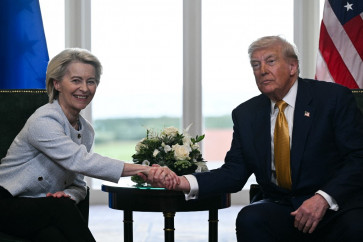Popular Reads
Top Results
Can't find what you're looking for?
View all search resultsPopular Reads
Top Results
Can't find what you're looking for?
View all search resultsThe EU must stand up to Trump
Whatever their views on existing regulations, Europeans must decide whether to surrender sovereignty and democratic processes to a bullying authoritarian populist.
Change text size
Gift Premium Articles
to Anyone
O
n July 27, the United States and the European Union announced a preliminary trade and investment deal in Turnberry, Scotland. But nothing was actually signed, and even if it had been, it would not have been worth the paper it was written on. After all, US President Donald Trump signed a formal trade agreement with Canada and Mexico during his first term, only to tear it up as soon as he returned to office.
Any agreement with Trump therefore must be regarded as, at best, a temporary truce. It will hold only until the US's capricious leader sees or hears someone or something that makes a new whim official policy.
Still, it is worth remembering the specifics of the Turnberry deal, because some were quite peculiar. Given that Europe has 30 percent more people and only a slightly smaller economy in purchasing power terms than the US, standard bargaining theory would imply that any deal would be roughly symmetrical. Instead, it was entirely one-sided. In addition to the US imposing unfair tariffs on European imports, Europe committed itself to investing in the US and purchasing US energy.
But, of course, the EU can promise no such thing. As I have jokingly pointed out to EU trade negotiators, Europe is not, yet, a centrally planned economy. The EU cannot force Europeans to make specific investments or purchases; the Turnberry numbers were offered merely to placate Trump, allowing him to boast that he had used United States power to claim another scalp and extract more of the value from global supply chains. Who cares if international law was trampled? That is simply what great powers do. Just look at Russia, with its war of conquest against a peaceful neighbor.
As I expected, the ceasefire did not last. Less than a month later, Trump was back to threatening Europe, this time over its Digital Markets Act, which seeks to ensure market competition, and the Digital Services Act, which aims to mitigate harms imposed on Europe by digital platforms. Among other things, the EU requires some “content moderation” to prevent the kind of algorithmic amplification of incitement to violence and misinformation that had such disastrous consequences in Myanmar, and it insists on taxing large technology companies that have not only hooked users but also avoided taxes.
Contrary to what Trump seems to think, these regulations are not discriminatory against the US and its tech giants. They are applied uniformly against all firms operating in the EU. They represent the outcome of a long deliberative process in which EU regulators and lawmakers carefully weighed the benefits and costs associated with alternative measures in the context of a rapidly changing world with rapidly changing technology. As in all such processes, views differed, with some worrying that the rules were too restrictive.
But I and many others worry that the rules are not restrictive enough. The tech giants still exercise too much market power, conduct too little content moderation, and continue to abuse privacy rights. The situation is having serious adverse effects on European society, especially among young people and its democratic politics.



















